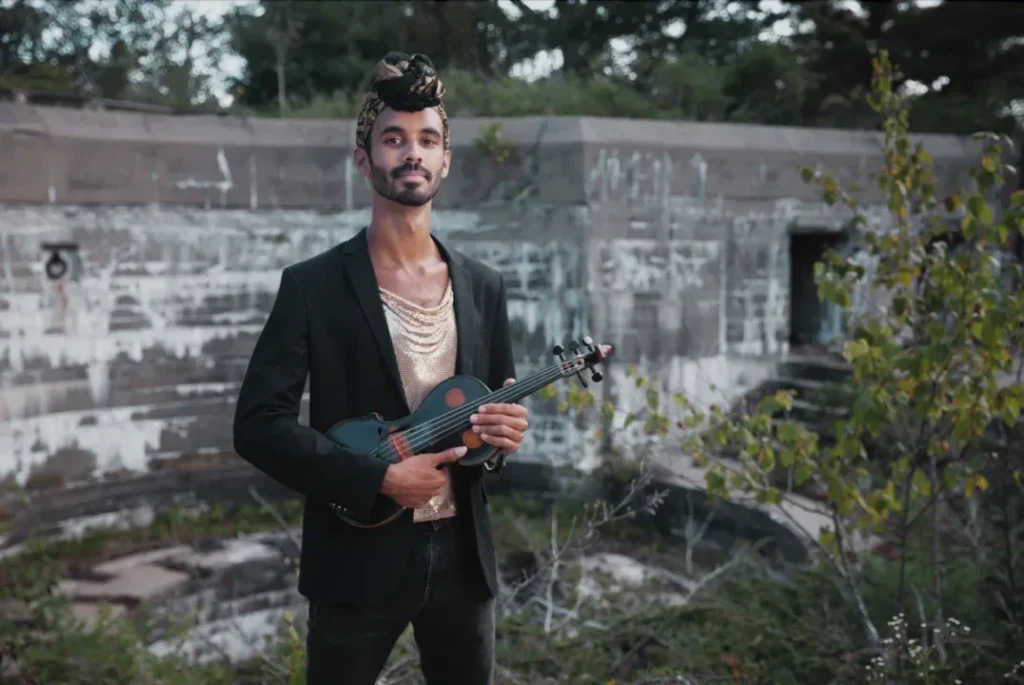We recently got to chat with Jake Blount on how his musical journey brought him to Ashokan’s Old Time Rollick year-after-year. Jake Blount (pronounced: blunt) is an award-winning interpreter of Black folk music based in Providence, RI.
Let’s start on how your musical journey began…
Jake: I started out playing electric guitar in rock bands when I was twelve! A chance encounter with a banjo player in high school led me (through circuitous routes) to string band music.
For people who are new to ‘Old Time’ music at the Rollick, how would you describe or define it?
I generally choose not to use the term “old-time music” because it’s happening now! What people now call “old-time” — what we’re focusing on at the Rollick — predates bluegrass, and is music that comes out of communal and dance-oriented settings. While people played these instruments in various styles all across the country, most of the standard repertoire comes from Appalachia (pronounced something like apple-atcha).
I call it string band music, because that’s at least one thing that’s true: the core of the ensemble (though not always the entirety of it) is made up of stringed instruments. While there are traditions in other countries and on other continents that use the same term, in the United States it generally refers to the music made within our borders. Bluegrass is probably the best-known form of it. Think fiddle, banjo, guitar, and bass — those are usually the core, though you’ll also spot mandolins, cellos and banjo-ukuleles in circulation. Depending on the region, you might also encounter a piano, accordion, washboard or jug!
What originally brought you to Ashokan’s Old Time Rollick Weekend?
Jake: I went to college in central New York, not so far away. I tried to get to every fiddle camp I could during those days! I had met Debra Clifford, one of the founders of Ashokan Old Time Rollick Camp, at a festival called Clifftop the summer before the first Rollick. When the camp was announced, I wrote her asking about scholarship opportunities, and she told me she’d find a way to get me there. To the surprise of none who knew her, she delivered! The following year I was stepped up to some nebulous staff-but-not-quite-faculty position, and now I’ve been back several times as part of the faculty.
What keeps you coming back?
Jake: The vibes are impeccable! It’s an incredibly fun crew of people every year, the music is always a great time, and the changes in leadership have led to some really wonderful variety among the faculty and the students. It’s more geographically and demographically diverse than most other camps of its type. It’s short, but sweet – and I think that brevity lets people relish every class and jam session, rather than rationing their energy to make sure they last until the end! I do, however, recommend bed before 3AM on the first night.
Can you describe the Rollick in just 3 words?
Jake: Great ******* time.
How about when you think of past Rollicks, where does your memory take you?
Jake: It’s honestly hard to pick one! The square dances, of course – and some late-night jams in the cafeteria!
Any tips for new Rollick-ers who are thinking of attending this July?
Jake: Most of us grow up in a culture that teaches us music is only for “gifted” people; that if you can’t play or sing like a pro, you just shouldn’t do it. For that reason, environments like the Rollick that emphasize participatory music-making can feel kind of intimidating if you’re not used to them – regardless of how welcoming the people around you are.
When I first came to the Rollick, I couldn’t play especially well. I personally found that making friends with people when I felt like we were on a level playing field made the vulnerability of shared music-making a lot easier to handle. I made a point to sit down at tables of mostly strangers at every meal, and sat next to strangers in my classes. I pushed through the weirdness of it all to ask folks about where they were from, what their lives were like outside of music – and of course, plenty about the music as well. Now I’m an instructor, and that’s still usually what I do!
Don’t miss your chance to connect with Jake at Ashokan’s Old Time Rollick.
Jake Blount (pronounced: blunt) is an award-winning interpreter of Black folk music based in Providence, RI. Initially recognized for his skill as a string band musician, Blount has charted an unprecedented, Afrofuturist course on his pilgrimage through sound archives and song collections. In his hands, the banjo, fiddle, electric guitar and synthesizer become ceremonial objects used to channel the insurgent creativity of his forebears. Balancing his taste for arcane source material with his desire to reach diverse audiences, Blount has shared his music at venues including Carnegie Hall, Newport Folk Festival, the Library of Congress and NPR’s Tiny Desk. His knowledge and skill have deepened over the course of his still-young career, and his vision has grown more ambitious – but his music has only grown in popular appeal. Blount’s debut solo record, Spider Tales (Free Dirt Records), was ranked among the best of 2020 by outlets including Bandcamp and The New Yorker. NPR, The Guardian, Rolling Stone and more named The New Faith (Smithsonian Folkways Recordings) one of the best roots releases of 2022. With the Steve Martin Banjo Prize, two International Folk Music Awards nominations and two first-place ribbons from Clifftop already under his belt, Blount’s star continues to rise.

